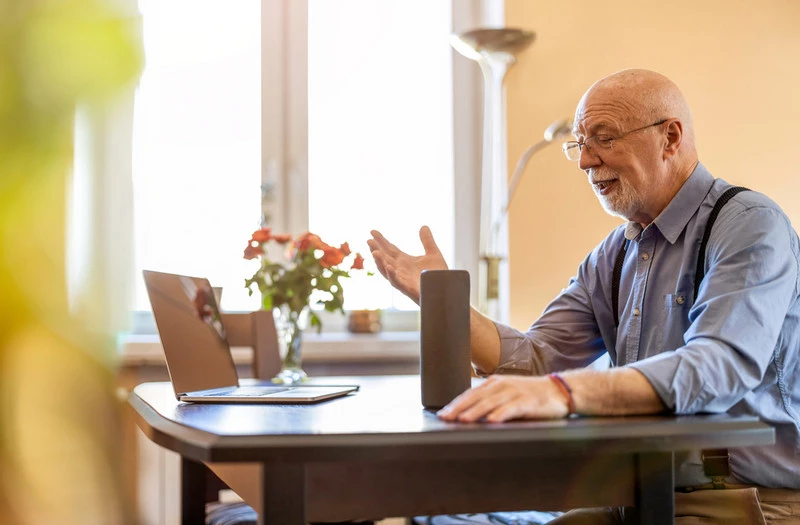A recent study performed by Stanford, on the effects of continuous health monitoring, basically...
A recent study performed by Stanford, on the effects of continuous health monitoring, basically flipped the script on not only what the medical community could accomplish but on the way AI and machine learning could revolutionize the sector. In this article, we’re going to dive deep into how AI for elderly care is the next big game-changer, and how right now - thanks to consumer products - what was once a pipe-dream is a click and an Amazon shopping incursion away.
Why are healthcare providers starting to offload certain parts of the care pathways to artificial intelligence?
It all started in the 1970s when rudimentary AI applications were infused into biomedical platforms in order to solve some of that industry’s problems. It was mostly used to improve clinical workflows and even pinpoint key data on a patient’s overall status. Back in that era, AI was just a conglomerate of very archaic - by today’s standards - algorithms. A pale version of what modern times has to offer. Nevertheless, AI transformed the healthcare industry by reducing cost, and patient outcomes, and increasing its overall efficiency.
Today, elderly care technology and AI can be used to:
- Reduce errors in diagnosis.
- Create complete and unique bio-medical profiles for each patient.
- Early disease detection.
- Intelligent symptom checking.
- Deep learning for actionable insights in care.
- Developing new medicine.
- Cloud-based repositories with big data that can predict and curb trends.
And those are just some of the amazing features AI is bringing to the health community. A Stanford study revealed that thanks to AI’s computational powers, continuous health monitoring could be optimized — which increased the overall life expectancy as well as the quality of it in over 108 test subjects. In many cases detecting disease and red flags, before they became a serious health issue.
Benefit of AI in elderly care.
By combining AI, machine learning, cloud-based repositories, blockchain security features, and quantum physics, today’s tech can super-charge not only the healthcare industry but healthcare in general — even at a consumer level. Not only allowing companies and doctors to predict scenarios, but create better care policies, standards, and even designer drugs. And not waiting months or years, but in the span of days.
And all of those features, and benefits, are cemented onto the cornerstone that is AI.
At a consumer level, how exactly can AI help the elderly?
Remote health monitoring
AI for elderly care, and not others, is now infused into many consumer-grade devices — from smartphones to smartwatches including all manner of tech-heavy peripherals you can order off the net. This allows for remote health monitoring. The elderly no longer have to physically go to a doctor to be supervised of their condition or status. Remote devices do it for you and in many cases send info and metrics to your doctor.
Portable and wearable biometric devices for assisted daily living
Portable devices are now easy to maintain, easy to interact with, and incredibly affordable when compared to their asking price a couple of years ago. By incorporating wearable tech senior living communities can become more efficient and depend less on their staff.
Virtual home assistants for the elderly
From SIRI to ALEXA, electronic virtual assistants - that can be customizable and learn from their users - are all gaining wide acceptance. They can optimize patient care and make living conditions far more efficient.

Smart implants
Right now smart implants, as of 2022, are in their infancy. Nevertheless, computer chips are being used to regulate certain health-related issues. And implants don’t just end with computer chips. Today’s companies are creating a smorgasbord of products, including insulin-regulating delivery methods, smart optic devices, ear implants, etc.
Anti-aging research
AI for elderly care has an added benefit, the ability to recollect and correlate data from patients. This helps pharmaceutical companies in creating complicated new drugs and molecular systems. Not only helping current health issues but reversing certain age-related problems.
Fall detection devices
Most devices, such as smartphones and smartwatches, have incorporated fall detection tools. They are incredibly important and essential for senior living communities. The problem has been in their accuracy. CareMate has many advances in data collection and analysis that reduces false positives making it many times more accurate.
Trends of Artificial Intelligence in senior care.
In the future, we will see more AI-powered robots and devices in elder care. They will help the elderly to maintain their independence for as long as possible. This technology could be helpful to the elderly but will most likely be expensive for most elder living communities — but also far more efficient and error-free than human caretakers.